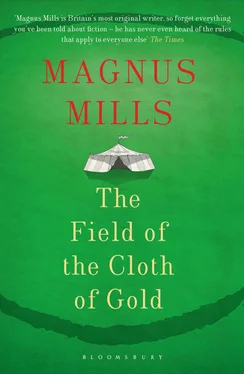The happenings in the south-east held everyone’s undivided attention. As a consequence, nobody noticed the ragged fellow who came stumbling out of the wilderness one blustery day. Like Thomas, he was bearded and barefoot, but there the similarity ended. The newcomer had no possessions and no tent; all he had was a coarse blanket which he wrapped around himself for warmth, and which he slept beneath at night. His name was Hippo, and his stated objective was to go amongst the tents and speak to the people. He chose the north-east encampment as his first port of call, and in due course presented himself at Hogust’s doorway. Unfortunately, some of the longboatmen regarded this as an act of gross impudence. They seized Hippo and were on the verge of throwing him in the river when Hogust interceded on his behalf.
‘Let him explain himself first,’ he said. ‘Then we’ll decide what to do with him.’
Hippo spoke eloquently and declared that he was carrying an urgent message which he wished to impart.
‘Come on then,’ said Hogust. ‘Let’s hear it.’
‘The people aren’t yet ready,’ replied Hippo.
‘I thought you said it was urgent.’
‘It is.’
‘So why are you speaking in riddles?’
Hippo was clearly taxing Hogust’s patience, but he seemed quite unaware of the jeopardy he was courting. Instead of answering the question, he announced loftily that first he needed to meet the people and get to know them.
‘Only then can I tell my story,’ he said. ‘In the meantime, perhaps you’d like to contribute to the cause?’
‘No, I would not!’ snapped Hogust. ‘If you’re looking for a handout, you can go and see Hartopp!’
Accompanied by a chorus of hoots and jeers, Hippo swiftly left the camp. It was an ignoble retreat, and he could count himself fortunate to have escaped Hogust’s clutches in one piece.
His arrival at the adjoining settlement, by contrast, was met with a wholehearted welcome. Just as Hogust had suggested, Hartopp proved to be a munificent benefactor. He fed and watered his guest, and even offered him the use of a spare tent. Surprisingly, though, Hippo elected to sleep under the stars.
‘Until the people are ready,’ he said, ‘the sky will be my tent.’
True to his word, when everyone else bedded down for the night, Hippo wrapped himself in his blanket and went to sleep. (Hartopp told me later that he felt very guilty about this.)
The next morning, following a generous breakfast, Hippo resumed his mission. He meant to visit all four corners of the field, so after calling on Brigant he inevitably turned up at my door. Luckily I’d been forewarned by the others, and I was prepared for him. I listened politely as he delivered his introductory speech, which was evidently a variation on a general theme. Meanwhile, I pondered whether he was a genuine visionary, a charlatan, or merely a victim of self-delusion. For the present, I resolved to allow him the benefit of the doubt, and to treat him with civility. Therefore, when he asked for a donation, I reached into my tent and produced the biscuit which Hen had given me. For a moment I felt a tinge of regret: after all, I’d harboured ambitious plans for that biscuit. It was imprinted with the letter J, and was an integral part of my project to forge trading links between the field’s many diverse settlements. Seen from this perspective, the biscuit’s intrinsic worth went far beyond its face value. In the event, however, I gave it to Hippo as the price of getting rid of him.
He thanked me profusely, then said goodbye and proceeded into the south-west. His course took him past the turf wall, which he examined briefly before continuing towards Hen’s tent. For some reason Hen was absent, so the next destination was Yadegarian’s distant colony.
I imagined that Hippo would find Yadegarian and his companions more receptive than anybody else in the field. Like him, they were highly idealistic people, and I assumed they would embrace him with open arms. Accordingly, I was astounded when I discovered that his visit had been a complete disaster. Again I only heard second-hand reports, but it transpired that Hippo took a very dim view of the exalted copper bath. He harshly censured the settlers for polishing it morning, noon and night, condemning the practice as both ‘foolish’ and ‘unworthy’; moreover, he enjoined them to keep the bath hidden from view and employ it only in its proper purpose. For their part, they resented his criticism and angrily drove him out of the encampment.
Hippo appeared destined forever to sleep out in the open, yet his fortunes swiftly changed when he headed for the thriving south-east quarter.
It so happened that Thomas and Isabella had recently instituted a ritual of their own. Without fail, they embarked each morning on a ‘progress’ through their adopted territory, following a fixed route that took them past the rows of encircling tents, then along the river bank as far as the crossing. When I learnt about this daily excursion, I concluded it was a means by which Thomas and Isabella could show themselves to the populace at large: he in his flowing white robes, she in her crimson finery. It was a calculated exercise, a further example of their unabashed regal posturing. Nevertheless, Hippo managed to turn it to his advantage. At a carefully chosen moment, he engaged with the strolling couple and urged them to beware of their own vanity. Obviously such a blunt approach carried the risk of immediate rejection; after all, Thomas was hardly renowned for his self-effacement and Isabella was fiery to say the least. The encounter might easily have been yet another catastrophe for Hippo, but on this occasion his luck held out. Perhaps it was the bare feet and the beard that made the difference, or maybe it was Hippo’s verbal fluency. Whatever the reason, it fast became clear that Isabella found the stranger highly fascinating. No sooner had they met than she was entreating him to relate his untold message. Once again, however, Hippo insisted that it could not be unveiled before he had travelled to every corner of the field. This proviso served only to deepen the mystique which surrounded him, and in Isabella’s case it was especially effective. At once she offered to accompany Hippo on his tour of the south-east; she also assured him that henceforth no doors would be closed in his face. Thomas, meanwhile, had lapsed into silence. It was difficult to tell if he perceived Hippo as a friend, as a potential rival, or as simply unfathomable. At any rate, he said nothing when Isabella made her pronouncement.
Hippo’s quest now rapidly gathered momentum. Escorted by Isabella, he made his way from tent to tent until the entire region was aware of his presence. He then declared that on the following day a public meeting would be held to which all were invited. Again, Isabella’s assistance proved invaluable. It seemed that Hippo had privately expressed reservations about his impact north of the turf wall. He was particularly disappointed at having failed to recruit Hogust, and he questioned whether anyone from the north-east would attend the meeting. Isabella, of course, refused to countenance such doubts.
‘Don’t worry about Hogust,’ she intoned. ‘I’ll deal with him.’
True to her word, Isabella marched across the field, skirted the turf wall with barely a second glance, and headed directly towards Hogust’s encampment.
Poor Hogust didn’t stand a chance: as a matter of fact he didn’t even see her coming. He was fiddling with the sails on one of his boats, hauling them up and down the mast, when suddenly she appeared before him. This was the first time they’d met each other in person, but Isabella didn’t bother with a formal introduction. Instead, she gave Hogust a severe dressing-down for the general untidiness of his camp; then, as he peered at her in speechless amazement, she issued a series of instructions concerning the time and place of the forthcoming assembly. In addition, Hogust was advised that a low turnout would not be acceptable.
Читать дальше












